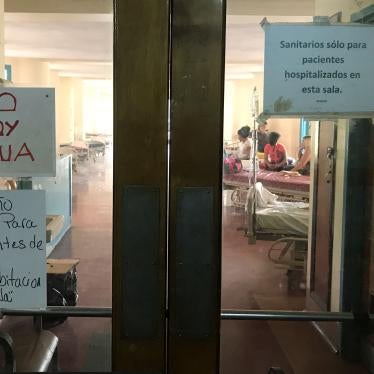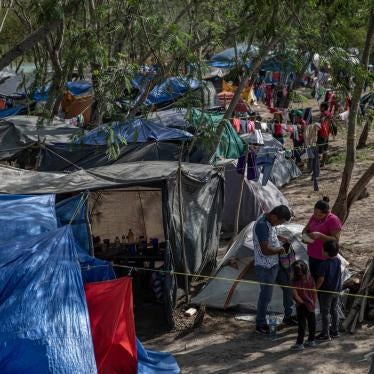Via Electronic Mail
Gabriel Reyes, Mayor
Gerardo Hernandez, Mayor Pro Tem
Ed Camargo, Council Member
Joy Jeannette, Council Member
Stevevonna Evans, Council Member
Adelanto City Council
11600 Air Expressway
Adelanto, CA 92301
Re: Conditional Use Permit No. 96-11
Dear Members of the Adelanto City Council,
I write on behalf of Human Rights Watch to submit these comments regarding the Conditional Use Permit No. 96-11 to allow GEO Group (“GEO”) to repurpose the Golden State Modified Correctional Facility located at 611 Frontage Road, as well as the Central Valley Modified Community Correctional Facility located at 254 Taylor Ave, into prisons for federal inmates and immigrant detainees (the “Project”). Human Rights Watch has documented serious abuses at Adelanto Detention Facility, operated by GEO, including severely substandard medical care that contributed to the deaths of multiple people at that facility. In light of this record, we are deeply concerned by a permit that would expand the number of people in facilities operated by GEO. The public health crisis in detention facilities across the world due to the COVID-19 pandemic underscores what is at stake when people are held in unsafe facilities. We urge you to deny this Project.
Human Rights Watch is a non-profit, independent organization and the largest international human rights organization based in the United States. Human Rights Watch investigates allegations of human rights violations in more than 90 countries around the world, including in the United States, by interviewing witnesses, gathering information from various sources, issuing detailed reports, and advocating for systemic change.
In 2017 and 2018, Human Rights Watch published reports investigating deaths in immigration detention, which included multiple accounts of people who died while in custody at facilities operated by GEO.[1] For both of these reports, independent medical experts reviewed detainee death reviews released by US Immigration and Customs Enforcement (“ICE”) involving deaths from 2012 to 2017. These experts found evidence of substandard and dangerous medical care in nearly all of these reviews, such as failure to follow up on symptoms that required attention; medical personnel apparently practicing beyond the scope of their licenses and expertise; severely inadequate mental health care; the misuse of solitary confinement for people with mental health conditions; and sluggish emergency responses. In 15 out of 33 cases, nearly half, the experts found the deaths were preventable.
Many of these deaths involved people held in facilities operated by private companies, including GEO. For these comments, we are providing information on specific cases in which subpar care at the Adelanto Detention Facility, operated by GEO, contributed to death.
Jose Azurdia, 54, died while in custody at Adelanto in 2015. He became ill and started vomiting. A guard told a nurse about Azurdia’s condition, but she said that “she did not want to see Azurdia because she did not want to get sick.” Within minutes, he was exhibiting symptoms of a heart attack but due to additional delays by the medical staff, two hours passed before he was sent to the hospital, with his heart by then too damaged to respond to treatment. He died in the hospital four days later.[2]
Raul Ernesto Morales Ramos died of organ failure with signs of widespread cancer in 2015 after being detained at Adelanto. The two experts who reviewed the records from his death investigation found that there had been symptoms of widespread cancer two years earlier, but that they essentially went unaddressed until a month before he died. Throughout this time, Morales-Ramos repeatedly begged for care.[3]
As noted previously, even in cases where our experts determined subpar care did not contribute to the person’s death, they found examples in most cases of dangerous practices or serious violations of applicable detention standards. For example, Osmar Epifanio Gonzalez-Gadba, 32, had been detained for three months at Adelanto and was waiting to be deported to Nicaragua when he died at a hospital on March 28, 2017, of injuries he sustained when he attempted suicide six days earlier in a solitary confinement cell. He had a diagnosis of paranoid schizophrenia and was placed in isolation on psychiatric observation status, which required 30-minute checks by security staff. The ICE review found there were numerous instances of security rounds failing to check in on him every 30 minutes as required, including on the day of the medical emergency that led to his death. Video surveillance footage of officers completing security rounds showed that officers did not look directly into cells to ensure individuals’ well-being. Independent medical experts agreed he should not have been put into solitary given his serious psychosocial disabilities.[4]
Prior to the deaths analyzed in our reports, ICE itself found delays contributed to the death of Fernando Dominguez Valdivia, who was detained in Adelanto in 2012. According to the Office of Detention Oversight summary of the investigation into his death, Adelanto staff failed to “facilitate timely and appropriate access to off-site treatment” for pneumonia that went undiagnosed for three months prior to his death.[5]
Focusing on deaths can hide how widespread and systemic medical failures are in the immigration detention system. For our 2017 report, we also analyzed medical records of individuals who consented to have their records reviewed by independent medical experts. “Jose L.” was detained at Adelanto for three years. According to his medical records, he had a history of lower back pain and diabetes. Both independent medical experts who reviewed his medical records for our report identified several instances in which care was unreasonably delayed. By the time he was deported in 2016, he was in a wheelchair, only able to walk short distances with a walker, and had lost vision in his right eye.[6]
Our own findings have been echoed by the Department of Homeland Security’s own watchdog, the Office of Inspector General, which found “untimely and inadequate medical care” at Adelanto Detention Facility.[7]
In response to our findings at the time of publication, GEO told Human Rights Watch it is unable to comment on individual cases but asserted that it provides “high-quality services in safe, secure, and humane environments.”[8] We recently requested an update from GEO regarding any change in its policies since these deaths in custody but received no response.
GEO’s persistently inadequate medical care, even as people died and subpar care was uncovered, amounts to a systemic failure by this company to protect the safety of the people detained in its facilities. The company should not be granted a permit to operate additional facilities in Adelanto.
Thank you for your careful consideration of our comments. If you have any questions, please do not hesitate to contact me at (323) 694-5181 or at mengg@hrw.org.
Sincerely,
Senior Researcher, US Program
[1] Human Rights Watch and Freedom for Immigrants, Systemic Indifference: Dangerous and Substandard Medical Care in Immigration Detention, May 2017, https://www.hrw.org/report/2017/05/08/systemic-indifference/dangerous-substandard-medical-care-us-immigration-detention; and Human Rights Watch, American Civil Liberties Union, National Immigrant Justice Center, and Detention Watch Network, Code Red: The Fatal Consequences of Dangerously Inadequate Medical Care in Immigration Detention, June 2018, https://www.hrw.org/report/2018/06/20/code-red/fatal-consequences-dangerously-substandard-medical-care-immigration.
[2] Human Rights Watch, Code Red, June 2018.
[3] Human Rights Watch, Systemic Indifference, May 2017.
[4] Human Rights Watch, Code Red, June 2018.
[5] Ibid.
[6] Human Rights Watch, Systemic Indifference, May 2017.
[7] US Department of Homeland Security, Office of Inspector General, “Management Alert – Issues Requiring Action at the Adelanto ICE Processing Center in Adelanto, California,” September 27, 2018, https://www.oig.dhs.gov/sites/default/files/assets/Mga/2018/oig-18-86-sep18.pdf;
[8] Response letters from GEO Group to Human Rights Watch, available at https://www.hrw.org/news/2017/05/08/us-detention-hazardous-immigrants-health#; Human Rights Watch, Code Red, June 2018.








